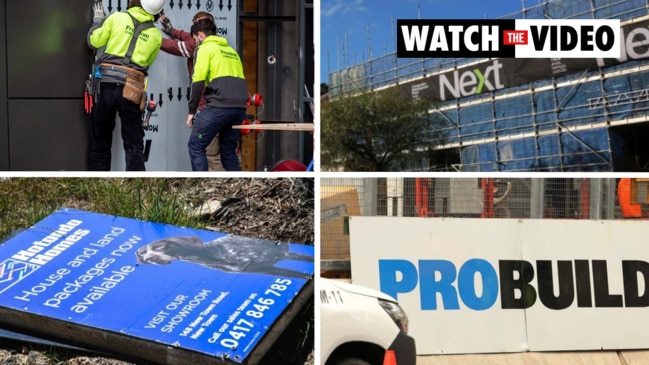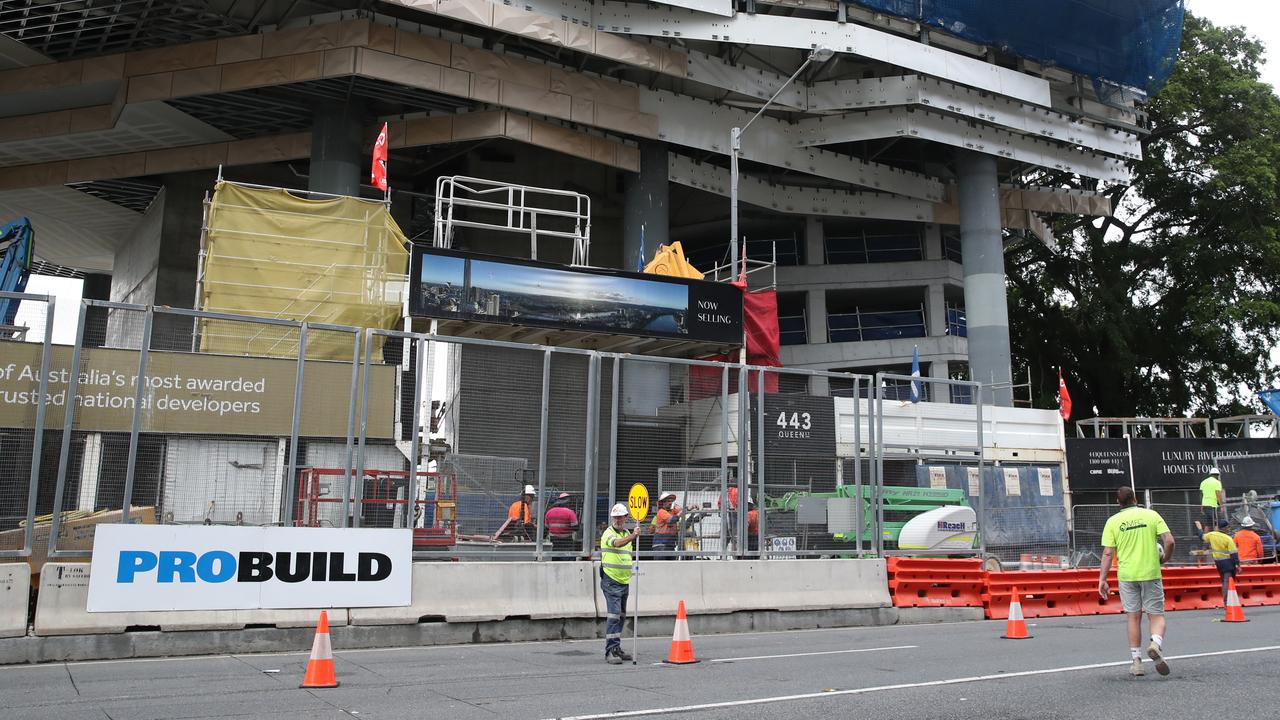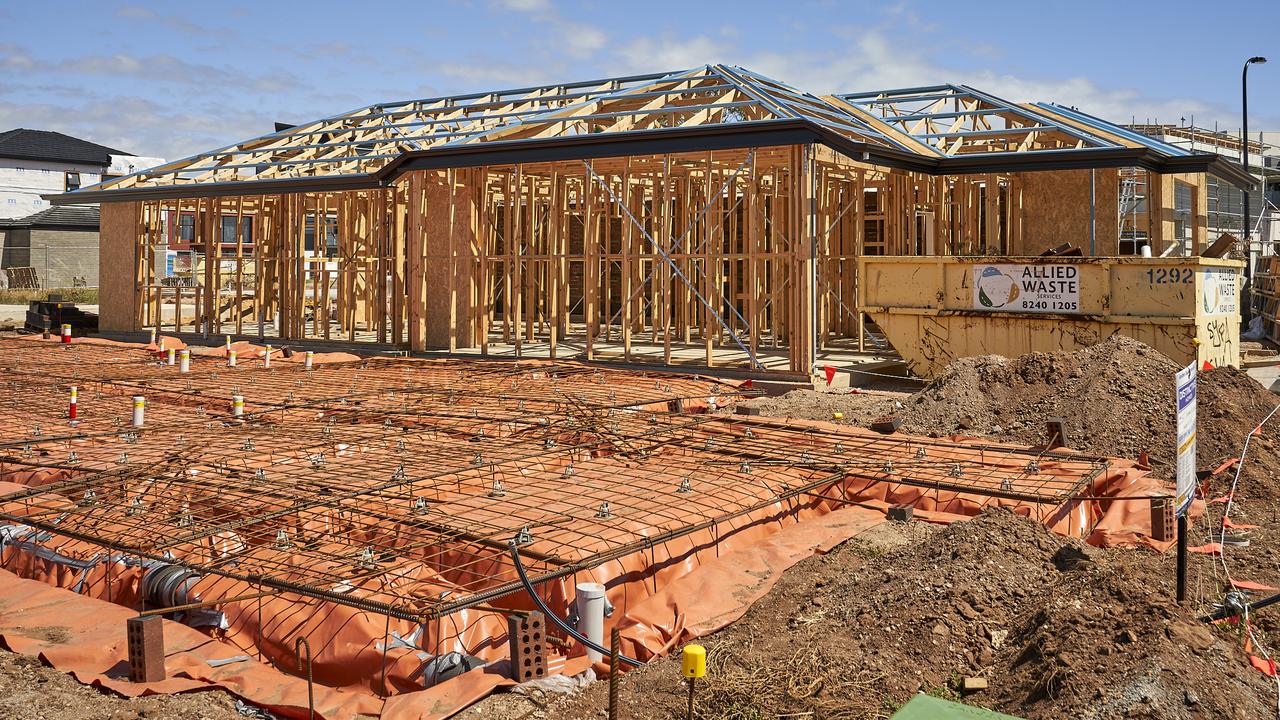‘Perfect storm’ of factors toppling Australia’s building industry
A slew of Australian building companies have collapsed in recent months with one insider blaming a “perfect storm” of factors that could see even more businesses fold.

Some of Australia’s biggest building companies continue to topple amid the strain of a “perfect storm” of factors that have pushed costs up for housing construction and created expensive delays.
It’s been estimated the cost of building a new house has increased by $76,715 in two years, with the average construction expense exceeding $400,000 for the first time, according to the Australian Financial Review.
It’s a figure that does not seem unrealistic to Master Builders Gold Coast regional manager Adam Profke.
“Homes are more expensive to build now than they were two years ago,” he said.
Mr Profke said builders had been battered by issues around the supply of materials since the emergence of the Covid pandemic, which has now been worsened by Australia’s trade sanctions against Russia following its invasion of Ukraine.
While Australia does not get a lot of timber from Russia and Belarus, it does rely on the region for the supply of Laminated Veneered Lumber (LVL), an engineered wood created by glueing multiple layers of thin wood together that’s popular for use as a structural beam due to its strength.
“LVL is in every two-storey house,” Mr Profke told news.com.au.
Mr Profke said the laminated timber is used to hold up the upper floor in two-storey homes, and said it was also used in single storey homes if people wanted timber that was dead straight, as not every tree grows perfectly.
The Australian Timber Importers Federation (ATIF) estimates Russia supplies between 40 and 50 per cent of Australia’s building market demand for a range of engineered wood products including LVL, Formwork LVL and I-Joist beams.
Stream more business news live & on demand with Flash. 25+ news channels in 1 place. New to Flash? Try 1 month free. Offer ends 31 October, 2022 >

Earlier this year the federation warned former trade minister Dan Tehan about the substantial detrimental consequences if trade sanctions were imposed, although it respected the moral stance the government was taking.
“ATIF estimates that restrictions on timber product imports from Russia will result in a 10-20 per cent reduction on employment across the supply chain,” the organisation informed members in a March-April bulletin.
“Subsequent delays to building activity are also likely to further acerbate supply difficulties and put upward pressure on product and building prices.
“ATIF believe that the Australian housing industry will be faced with a significant risk should Russian timber product imports be threatened by trade sanctions.”
The collapse of building giant Probuild happened in February prior to materials from Russia and Belarus being marked as “conflict timber” on March 4, and the government has agreed that goods shipped prior won’t be subject to the 35 per cent import tariff.
However, the issue has placed additional strain on businesses in an already challenging environment.
Several other failures have followed the fall of Probuild including the collapse of Gold Coast-based firm Condev in March. Australia’s largest home builder Metricon was also recently thrown a $30 million lifeline to keep its struggling business afloat.
Smaller operators have also succumbed including Hotondo Homes Hobart, Home Innovation Builders and Sydney-based Next, while staff at Queensland builders Pivotal Homes’ were all terminated on the spot last week. Over the weekend, Queensland construction firm Solido Builders revealed it had appointed liquidators.
Mr Profke said a number of factors were playing a part in the issues the construction industry was facing.

“It started off with Covid and people slowing down in terms of building activity, then we had some stimulus that kicked off activity and increased demand,” he said.
“Covid restrictions meant people weren’t travelling and so were saving money so they decided to put this money into their homes, driving the renovations market. But because of Covid the supply of materials reduced.”
Mr Profke said demand for products had been completely outstripping demand – and this was before Russia’s invasion of Ukraine created even more issues.
Delays in getting materials due to both the Ukraine conflict and Covid restrictions meant builders could not complete as many projects as they did previously, and the costs for the materials were also increasing.
“If normally you build 10 houses a year … but you are only doing two or three, you lose profit and money,” he said.
“The hammer blow is the fact that what you budgeted to build the house for, can’t be delivered for that, it costs more and also eats into your profit.”
Mr Profke said the price of timber and reinforcing steel had gone up by nearly 100 per cent in the last 12 months. Other big ticket items had gone up by 40 or 50 per cent.
“We’re seeing price rises on a monthly basis, and while it has slowed since last year, we are still seeing prices rise for something new every month,” he said.
This is partly because of Australia’s heavy reliance on materials from overseas for its home construction projects.
“At one stage during Covid lockdowns you couldn’t buy a door handle or lock from Bunnings, which was almost unheard of,” Mr Profke said.
“Unfortunately there is delay in almost every item in the supply chain for construction across the board as the bulk of what we use does come from overseas.”

Even if builders could find locally manufactured products, these suppliers were generally not able to meet the huge increase in demand.
Unfortunately, Mr Profke believes more businesses could collapse.
“We hope for the best but we also have to be realistic – some businesses won’t be able to sustain the losses continuously,” he said.
“I think every business will be at risk at some point, it doesn’t matter whether they are big or small, the businesses that can manage their risk better will be able to sustain it better in the long run.
“There’s not one builder in the industry that hasn’t suffered some kind of financial loss as a result of what’s going on at the moment.”
The irony is that demand for their building services continues to be high.
“The work is there, particularly in Queensland and the Gold Coast, there’s plenty of demand in the industry, it’s just a matter of getting through the backlog of work,” he said.
Mr Profke said he wasn’t sure the government could do anything to solve the issue in the short term.
“They can’t make the war in Ukraine stop,” he said. “And the other thing to remember is that the suffering happening in Australia is also being felt by the building industry around the world, we are not alone.”
More Coverage
Importantly Mr Profke said people working in the industry needed to take care of their mental health.
“If people are extremely stressed, I would encourage them to reach out for support where it is required,” he said.
“These factors are outside our control and we’re just riding it out as best as we can.”





